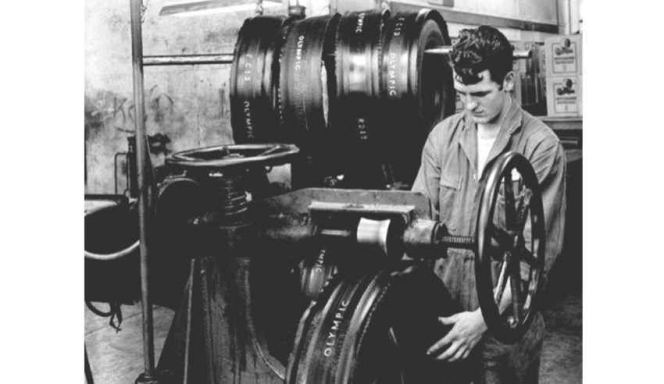
Nothing is stable. Technology is continuously evaluated. Materials science, electronics and software are the main three engines that reverse reactions or open new horizons.
Tyres are always known as black and round. However, the tyre engineers are aware of the weight achieved, the construction and the types of materials used in the tyres. What was the ancestor of the tyre, where is it going now?
The tyres were rated very quickly after vulcanisation 150 years ago. The first use of synthetic rubber and synthetic fibers, as well as the first radial tyre, go back around 70 years. Programming the control of the tyre building and curing machines with sensors and timer was a cornerstone. The new chemicals and advanced materials which suit well for process control, more homogeneous mixing, material integration and long-lasting rubber products.
Today's tyres last to the end of their useful life, which is primarily measured by the Remaining Tread Depth (RTD) which is greater than a limit value set by local legal approval. Twenty years ago, many defective tyres were found in scrapyards that were almost like new, but today the tyre will last almost lifetime.
Today, Mechanical rubber derivatives production machine parts are made to tighter tolerances. The integrity of the main body material is higher than in previous years. Alloys or composites are widely used compared to recent years. More controlled and homogeneous surface finishing is applied. Modern tyre production machines are equipped with robotics, full sensors and automation, stepper motors and greater controllability which are examples of the harmonization of creativity and innovation in the industry.
More than all that, today manufacturing machines are more purpose oriented, lighter, sensitive and modular.

The other very preliminary point of view is to analyse the needs of the main processes and what should be the strategy when you have an idea to buy new machines?
Every system needs new machines to install for a reason. It is used either to increase capacity or to renew a range of products, just to modernise or update technology. What should be the strategy when you have an idea to buy new machines? Either you are looking for a machine that matches your technology or you are taking the risk of a technology upgrade. The same category but a more efficient, more productive, safer and more controllable machine may be preferred or a completely new technology may be chosen.
If a very new technology is chosen, the time it takes to adapt can result in large production losses. It may take longer to adapt, etc. However, if you don't take such a risk, how will you manage the technology update in later years?
The other very preliminary point of view is to analyse the needs of the main processes. For example, if you are a tyre manufacturer, customers will only know your brand name. You are responsible for the end product. Third parties do not know where to start preparing tyres or what process to use to make them.
For example, you can have a textile calendar or you can get calendered textile and steel layers on the outside. When using a supplier, you don't need a factory calender machine. This also applies to the compounds used in the manufacture of the components. Today, a large volume of masterbatch is used in the rubber products industry. Organizing a good supply chain for manufacturing rubber compounds eliminates the need for mixers, a few mils, large silos, or process oil tanks.
A review of all processes and machine setup is necessary at regular intervals in order to remain competitive. Fewer production machines can increase productivity and controllability and intensify management. Less personal use, less energy and maintenance costs can be achieved. However, alternative suppliers need to be developed and diversified.
In the past, some particularly large tyre manufacturers had tyre cord treatment units in tyre factories. Some of them have steel wire production facilities for their own supply. Today we are witnessing a complete change of mind. The focus on the main process areas is mainly taken into account, which has completely changed the perspective in business. Today, most tyre manufacturers contract out the processing of 2nd class compounds. So, there is no refinery mill machines in tyre factories. The heating of the rubber in the preparation zones of the main components is carried out by cold feed extruders. Large capacity extruders are used under the drop door in mixing rooms. As a result, there are very few milling machine and milling operators in the tyre factory. Factory structures are smaller, parts production and machine maintenance are outsourced.
Full robot transfer units already exist, No man-tyre building and curing are achievable now. Profile extruders are already disabled, calendering might be totally needless by body ply webbing on tyre building drums.
Being open and innovative in the tyre and rubber industry is important. Support for technological innovation and productivity, as well as the vision to find more efficient devices, is required. New control systems with computers and automation are inevitable. Indeed, the company's employees must have a vision to choose the last and the best for the future. The most important thing is to find profitable solutions for the entire company.
As you follow the progress of the machine, keep in mind that new materials are coming. Any fashionable material will one day be a burden on the staff. Major hardware changes require new processes or machines. The ultimate case is the cancellation of part of the process, which means the cancellation of the production machines. Such a case can be irresistible at any time.
The increasingly demanding structure of the automotive industry and regulations will demand ever lighter, more environmentally friendly and more rolling-resistant tyres, which repeatedly calls for ambitious innovations. Innovative materials are inevitable to exceed expectations. Just as new materials come out of the R&D thicket box and enter the daily production inventory, the production area and machinery should be reorganised.
Full robot transfer units already exist in many phases instead of being transported. There are automatic scan and uniformity checks. No man tyre building and curing operations are achievable now. Profile extruders are already being phased out in some tyre factories. Body ply webbing could be more of a standard technology in tyre building. Calendering may be totally needless in tyre plants.
As far as automation and controllability technologies assess, there is still room for refinement or cancellation of production processes and machines in tyre factories.
Today, Mechanical rubber products production machine’ parts are made to tighter tolerances. The integrity of the main body material is higher than in previous years. (TT)
Hankook Confirms Partnership As Sponsor For Convoy Truck Shows 2026
- By TT News
- March 04, 2026
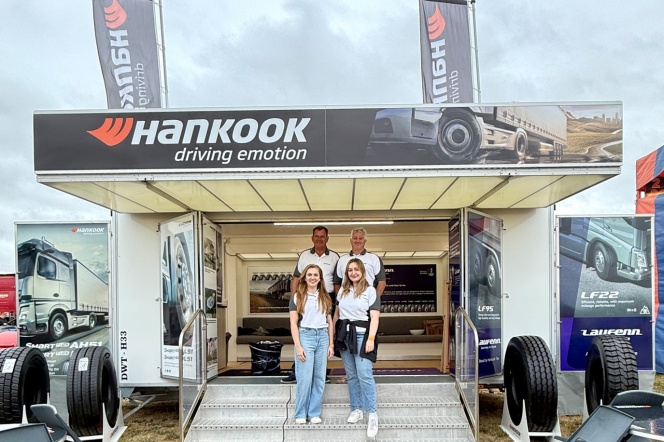
Hankook has confirmed its partnership for the 2026 Convoy Truck Shows, stepping in as an infield partner for the series, which runs in tandem with the British Truck Racing Championships (BTRC). These events offer a distinctive fusion of high-octane track action and the immersive atmosphere of a large-scale truck gathering. This renewed involvement deepens Hankook’s footprint at some of the most eagerly awaited dates on the UK motorsport and haulage calendar.
The season’s schedule commences with Convoy on the Plain on 16–17 May, followed by Convoy Cymru on 20–21 June. The flagship gathering, Convoy in the Park, will round off the summer season on 8–9 August. Attendees can look forward to a full agenda of British truck racing, breathtaking stunt performances, live entertainment and attractions for all ages, alongside a remarkable display of working vehicles, custom rigs and pristine show trucks. Mirroring its sponsorship of the Devon Truck Show, Hankook’s partnership with the Convoy series supports its wider mission to generate substantial donations for local charitable causes and community groups, positioning it as an event with purpose beyond spectacle.
At each of these shows, Hankook will spotlight its cutting-edge range of commercial and consumer tyres. Key exhibits will feature the SmartFlex AH51 for steer axles and the SmartFlex DH51 for drives, both engineered for long-haul and regional use and prized for superior traction and extended durability. Also on show will be the SmartFlex TH31 trailer tyre, the Vantra Transit summer tyre for commercial vans and several models from the Laufenn portfolio, such as the LZ22 all-weather drive tyre, the LF21 all-position tyre and the robust LF95 trailer tyre.
Rounding out the display are the Dynapro HP2 all-season SUV tyre and the iON evo SUV, a cutting-edge summer tyre purpose-built for electric vehicles, underlining Hankook’s forward-looking approach to sustainable mobility. Through its involvement in the Convoy Truck Shows, Hankook reinforces its dedication to the haulage industry by engaging directly with drivers, fleet operators and enthusiasts, showcasing tyre innovations focused on safety, efficiency and peak performance, all while actively contributing to valuable community initiatives.
Event Director Mike Quartley said, "We’re thrilled to have Hankook Tyre UK return as an official sponsor of the Convoy Truck Shows. After the success of last year’s collaboration, continuing the partnership was an easy decision for us. Hankook’s commitment to the industry and to our events adds real value across the board – from contributing to the scale and quality of the events to elevating the atmosphere and experience for our audience. We’re proud to be building on this relationship as the Convoy series continues to grow.”
- Tire Technology Expo 2026
- 2026 Tire Technology International Awards
- BioButterfly Project
- Twaron Next
- Lunar Airless Wheel
- Primacy 5 Energy
Tyre Industry Celebrates Innovation And Sustainability At 2026 Tire Technology International Awards
- By TT News
- March 04, 2026
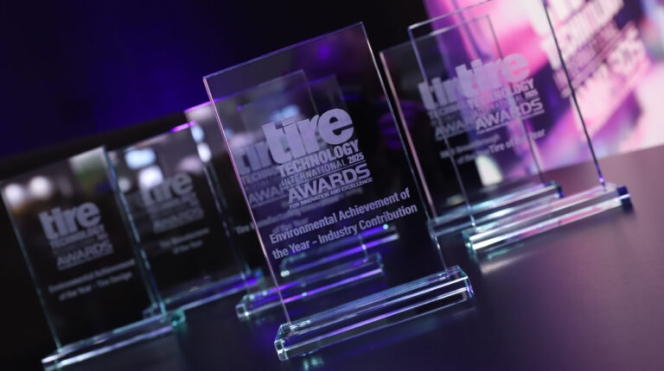
The tyre industry gathered to honour outstanding innovation and individual accomplishment over the past year during the Tire Technology Expo 2026 held in Hannover. The Tire Technology International Awards, spanning 13 categories, recognised both technological progress and the commitment to a more sustainable future within the tyre sector. Organised by the Tire Technology International magazine, the winners were selected by an independent panel of journalists and technical experts.
Sustainability was a dominant theme, highlighted by three distinct environmental awards. Bridgestone received the award for tyre design innovation, celebrated for developing a truck tyre composed of 70 percent recycled and renewable materials, a notable industry milestone. In manufacturing, Continental was acknowledged for its significant strides in reducing freshwater consumption during production with the Environmental Achievement of the Year – Manufacturing award. The Environmental Achievement – Industry Contribution award went to the BioButterfly project, a collaborative effort involving Michelin, IFP Energies Nouvelles and Axens. This initiative was praised for creating bio-based butadiene from bioethanol, presenting a credible substitute for fossil fuel-derived materials and demonstrating strong potential for immediate industrial application.
Further technical achievements were recognised across several categories. Flexsys earned the Chemicals and Compounding Innovation of the Year award for developing the first practical alternative to the antioxidant 6PPD after extensive research. Teijin Aramid was honoured with the Materials Innovation of the Year award for industrialisation of its high-performance Twaron Next para-aramid fibre. A collaborative R&D breakthrough by Goodyear and TNO, which integrates tyre intelligence directly into a vehicle's automatic emergency braking systems to enhance safety, won the R&D Breakthrough of the Year award. In manufacturing equipment, Comerio Ercole’s advanced modular calendering line, Zeus, won the Tire Manufacturing Innovation of the Year award. Uzer Makina, a long-time finalist, was finally named Tyre Industry Supplier of the Year.
The event also celebrated conceptual and product excellence. Michelin had a particularly successful evening, first winning the Tire Concept of the Year award for its Lunar Airless Wheel, designed to withstand the extreme conditions on the moon. The company then claimed the highly anticipated Tire of the Year award for its Primacy 5 Energy, a tyre noted by the jury for achieving top EU label ratings in most sizes while offering improved longevity and reduced emissions compared to its predecessor. In the final major category, Continental was named Tire Manufacturer of the Year for the second consecutive year and the fifth time overall, following a review of the top manufacturers' yearly contributions.
The awards also highlighted personal achievements within the field. The Young Scientist Prize for 2026 was presented to Max Dixey, a PhD student at Queen Mary University of London, for his compelling presentation on the effects of carbon black activators. Finally, a Lifetime Achievement Award was bestowed upon Michelin’s Pascal Prost. A veteran engineer, researcher and long-time contributor to both the conference and the awards jury, Prost was celebrated by peers and colleagues for his enduring and significant impact on the tyre industry.
Matt Ross, Chairman of the awards and Editor-in-Chief of Tire Technology International, said, “As is now becoming the norm, this year’s awards were incredibly close. Continental and Michelin have picked up multiple awards and should be highly commended, but I’m also happy to see such an array of winners across the whole range of categories. The level of innovation on display across the tyre sector is staggering, and I hope that this year’s awards have captured even a hint of the groundbreaking work taking place to move this industry forward.”
On Frost’s achievement, Ross said, “For as long as I have worked on Tire Technology International and these awards, Pascal has been a valued contributor, a hugely appreciated advisor – and a wonderful sounding board. I would like to join with his peers and friends from across the industry in celebrating his phenomenal contribution to the tyre business.”
MRF Signs MoU With Tamil Nadu For Greenfield Plant At Sivaganga
- By TT News
- March 04, 2026
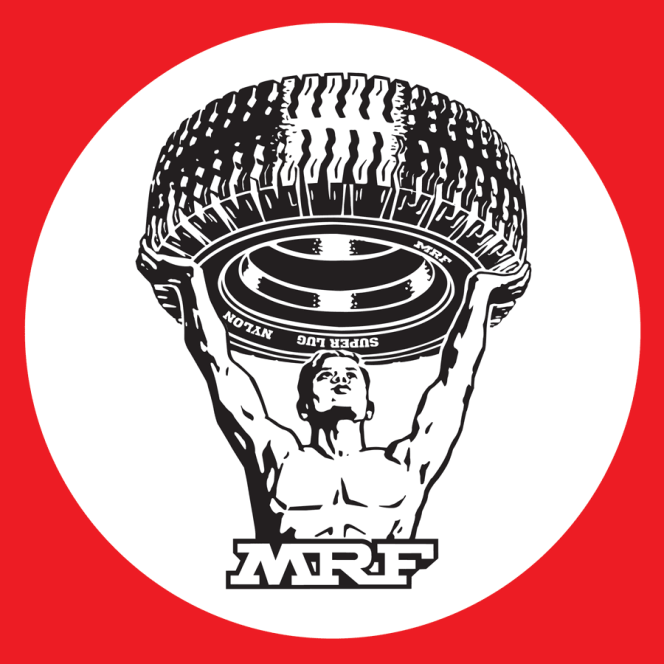
MRF has announced a significant move to expand its manufacturing footprint in southern India. The company revealed that it has signed a non-binding memorandum of understanding (MOU) with the Tamil Nadu Government, facilitated through the state’s nodal investment promotion agency, Guidance. This preliminary agreement outlines the company’s intent to establish a greenfield manufacturing unit dedicated to the production of automotive tyres and related ancillary products. The proposed facility is planned for location within the SIPCOT Industrial Park situated in the Sivaganga District of Tamil Nadu.
As the agreement is currently non-binding, its progression to a final commitment is contingent upon several conditions. These include the Tamil Nadu government’s sanction of a bespoke incentive package, the provision of necessary infrastructure, the allotment of land and the securing of all requisite statutory approvals in accordance with applicable state laws.
According to the official statement released by MRF, the project, upon receiving all clearances and moving forward, envisions a substantial capital outlay. The estimated investment for this venture is projected to be approximately INR 53 billion, with the capital expenditure to be phased over a 12-year period. Beyond the financial injection into the region’s economy, the initiative is also anticipated to be a major source of employment, with expectations of creating direct job opportunities for around 1,000 individuals.
- Sailun Group
- Sustainable Development (ESG) Industrial Ecosystem Innovation Competition
- Vale
- Mining Tyres
Sailun Group Honoured With ‘Innovative Model’ Award At Shanghai ESG Competition
- By TT News
- March 04, 2026
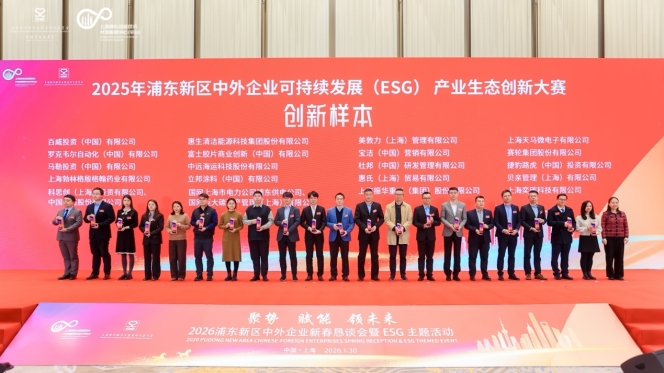
The second Sustainable Development (ESG) Industrial Ecosystem Innovation Competition for Chinese and Foreign Enterprises in Shanghai’s Pudong New Area recently concluded, with Sailun Group emerging as a distinguished honouree. Recognised for its collaborative ESG efforts with Vale, a global leader in metal and mining, Sailun received the prestigious ‘Innovative Model’ award, standing out as the sole tire company to achieve this recognition.
Organised jointly by the Shanghai Pudong Foreign-Invested Enterprises Association and the Shanghai Pudong Domestic-Funded Enterprises Association, the competition welcomed participation from companies registered and operating in the area, along with their partners. Invited by Vale Metals (Shanghai), Sailun took an active role by meticulously organising and presenting its innovative achievements in sustainable development. Through a structured application process highlighting solid practices and creative excellence, the company successfully secured the award.

Vale, one of the world’s foremost iron ore producers, maintains a longstanding strategic partnership with Sailun. Driven by a mutual dedication to sustainable supply chains, the two organisations have intensified collaboration, particularly in mining tyre supply. By integrating Sailun’s low-carbon tyre technologies, they inject environmental vitality into operations while enabling Vale to achieve refined efficiency through cutting-edge solutions. Their partnership exemplifies a synergistic model that harmonises efficiency, safety and low-carbon practices, serving as a standout case of ESG-driven empowerment across the industrial chain.







Comments (0)
ADD COMMENT